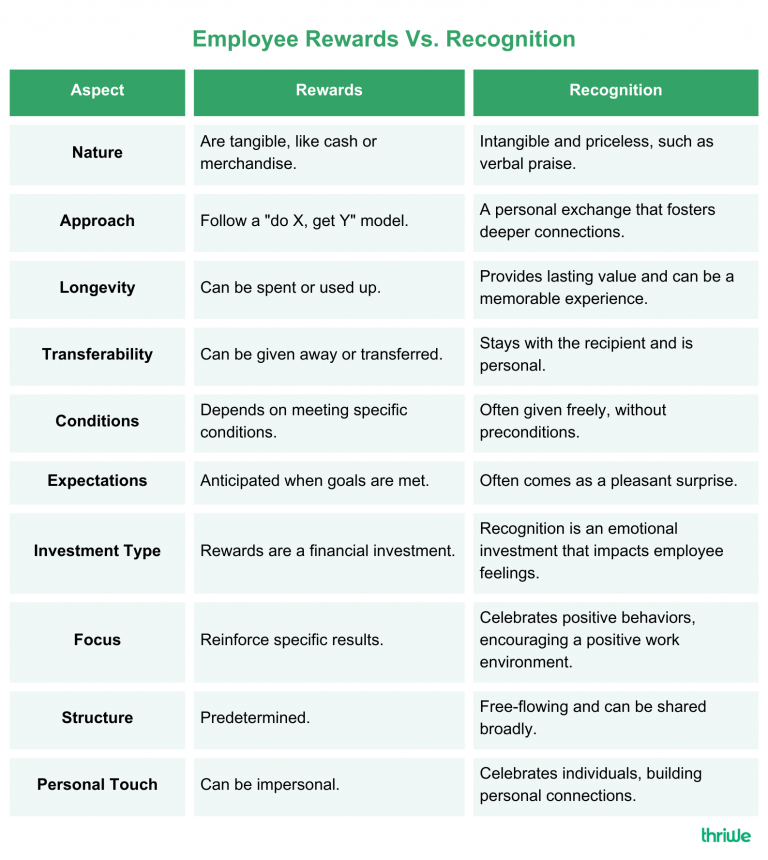


Imagine dedicating yourself fully to a project and executing it perfectly. You would feel great, wouldn't you? That feeling becomes even more powerful when someone recognizes your achievement. In today's workplace, the significance of rewarding and recognizing employees cannot be overstated.
When employees invest their time, energy, and creativity into their work, the acknowledgment of their efforts amplifies their sense of achievement and belonging. This act of recognition not only uplifts morale but also fosters a culture of engagement and loyalty, driving performance and retention.
As organizations face increasing competition for talent, the strategies employed to demonstrate employee value have become crucial. Effective rewards and recognition programs are essential in motivating employees, aligning them with organizational goals, and enhancing overall job satisfaction.
By prioritizing these programs, companies can create a thriving environment where employees feel valued and motivated to excel. In fact, companies are rethinking their HR policies to retain top talent and cultivate a better work culture. According to Forbes, one of the most effective strategies is implementing robust reward & recognition programs for employees.
To help your business enhance organizational performance, we have created a detailed guide on the importance of employee reward and recognition programs, ultimately improving organizational performance and fostering a positive work culture.

Robust reward & recognition programs have proven to be effective in fostering a positive workplace.
An employee recognition and rewards program is a system that acknowledges and celebrates the achievements and contributions of employees within a company. Typically, recognition is shared on a platform visible to all internal employees, often accompanied by points that can be redeemed for various rewards such as vouchers, gift cards, and coupons.
The goal of these programs is to boost employee morale, enhance performance, and retain talent. Rewards can range from financial bonuses and gift certificates to paid time off and public recognition. Employees usually earn these rewards by meeting specific goals or objectives set by the organization.

Reward & recognition programs for employees can help boost morale, enhance productivity, and encourage loyalty.
According to a report by the Brandon Hall Group, companies with a strong culture of recognition are three times more likely to see increased employee retention, five times more likely to experience higher employee engagement, and 2.25 times more likely to give frequent recognition. Furthermore, 79% of these organizations rate their employer brand highly, highlighting the effectiveness of reward & recognition programs for employees.
Though often used interchangeably, both reward & recognition programs for employees serve distinct purposes in employee motivation. Rewards are performance-based or sales incentive programs, aimed at motivating individuals or groups. Separate from salary, these rewards can be monetary or have a financial aspect, like cash bonuses, travel, or gift cards. The primary goal of an employee rewards program is to enhance employee performance.

Rewards entail tangible benefits, while recognition emphasizes acknowledgment and appreciation.
In contrast, recognition focuses on giving a psychological boost by praising employees for their work or accomplishments. It's about acknowledging effort and achievements rather than offering physical prizes.

In today's dynamic business environment, the significance of reward & recognition programs for employees cannot be overstated. Let's delve into why they matter:
Now, let's strengthen our understanding of the importance of reward & recognition programs for employees with some statistical data.
According to Deloitte, recognized employees are four times more likely to be engaged in their work, leading to a 14% increase in productivity and performance. This heightened engagement results in improved organizational outcomes, with a potential 2% increase in margins for every 15% improvement in engagement.

Recognized employees are four times more engaged, boosting productivity significantly.
The impact of employee reward and recognition programs extends to reducing turnover rates, a critical concern for businesses. Employees who feel valued are less likely to leave their jobs. Companies with strong recognition cultures experience 31% lower rates of voluntary turnover, highlighting the importance of acknowledging employees' contributions to retaining talent.
Reward & recognition programs for employees play a significant role in fostering a strong connection to company culture. When employees feel recognized and appreciated, they are five times more likely to feel connected to the organization's culture. This sense of belonging enhances employee satisfaction and engagement by four times, contributing to a positive workplace environment.
Employee reward and recognition programs drive desirable behaviors within the organization. When employees are acknowledged for their efforts, they are more likely to repeat those actions, leading to sustained performance improvement. A staggering 92% of workers express a willingness to repeat specific actions after receiving recognition.
Moreover, recognition has a direct impact on employee energy and effort. Over 40% of employed individuals believe that increased recognition would result in higher levels of energy invested in their work. This demonstrates the significant influence of recognition on employee morale and commitment to their responsibilities.
In crafting effective employee reward and recognition programs, it's crucial to consider the following key components:
Rewards and recognition should be spontaneous and targeted, appreciating employees promptly for their efforts and achievements to maintain program authenticity and motivation.
Active participation of senior management reinforces the program's importance, signaling to employees that their contributions are valued, enhancing engagement and motivation.
Customize rewards to suit the diverse demographics of your workforce. While cash bonuses and extra time off are universally appealing, consider offering a selection of merchandise, gift cards, or experiences to ensure meaningful employee reward and recognition programs for all.
Peer acknowledgment holds significant value by fostering a sense of pride and respect among employees. Recognition from colleagues builds camaraderie and trust, boosting engagement levels.

Peer acknowledgment fosters camaraderie, trust, and engagement among employees.
Sustaining employee interest requires diverse recognition methods. Through employee reward and recognition programs at various levels and under different criteria, organizations can keep the program exciting and inclusive, leading to a happier workforce.
Aligning the employee reward and recognition programs with organizational values ensures engagement for the right reasons. By integrating performance and behavioral criteria with corporate values, the program reinforces company culture and enhances overall effectiveness.
In today's world, where everyone values a good work culture that supports them professionally, financially, and mentally, it's become important to ensure your employees feel appreciated and recognized. This boosts their happiness at work and helps them be more productive.
Here are 20 effective and innovative ideas to enhance your reward & recognition programs for employees.
Move beyond routine birthday emails with personalized celebrations. Arrange intimate team gatherings to foster camaraderie and make employees feel valued and appreciated.

Elevate celebrations with personalized gestures, floating days off, and intimate team gatherings to foster appreciation and camaraderie.
Foster mutual appreciation with peer endorsements using badges aligned with organizational values. Introduce gamification elements like progressions to coveted titles or exclusive club memberships to incentivize participation and strengthen team dynamics.
Employee success stories are a testament to the organization's achievements and the collective efforts of its workforce. Highlighting these stories in monthly newsletters not only celebrates individual accomplishments but also fosters a sense of pride and community among internal stakeholders. Sharing these narratives inspires others to strive for excellence and reinforces the organization's commitment to recognizing employee contributions.
Recognizing top performers publicly is a powerful way to boost morale and reinforce desired behaviors. Whether through congratulatory announcements in the workplace or virtual platforms, acknowledging employees' achievements in front of their peers fosters a culture of admiration and inspiration. It also creates a sense of accountability and encourages others to emulate the recognized behaviors.
Include employees' families in recognition efforts by inviting them to company events or organizing special gatherings. This shows appreciation for their support and strengthens the bond between the employee and the organization.
Introduce symbolic tokens like distinctive hats or badges for top performers. These visible reminders of outstanding contributions boost morale and motivate others to strive for excellence and earn similar recognition.
Providing top performers with exclusive opportunities to engage with senior leadership reinforces their value and belonging. Through one-on-one meetings, group sessions, or special events, employees share insights and aspirations directly with decision-makers, offering valuable feedback and workforce insights.
Handwritten notes remain a timeless way to express gratitude. Taking time to pen a heartfelt note demonstrates sincerity and thoughtfulness. These personal gestures, whether simple thank-yous or detailed messages, leave lasting impressions and strengthen employee bonds with the organization.

Composing handwritten notes shows genuine appreciation, fostering stronger employee connections.
Leveraging technology for recognition extends efforts beyond organizational boundaries. Virtual platforms for sharing achievements, peer congratulations, and feedback amplify recognition's impact. Integrating these platforms with existing communication channels ensures visibility and engagement across the organization.
Producing short films or employee interviews showcasing achievements adds a multimedia dimension to recognition. These visual tributes celebrate accomplishments and humanize recognition by highlighting personal stories. Sharing these on internal channels and social media enhances visibility and reinforces recognition efforts.
Featuring top performers on the company website alongside leadership profiles amplifies their visibility and prestige. Dedicated sections highlighting their achievements and milestones showcase their value and reinforce their status as role models, boosting morale and enhancing the organization's reputation.
Tailoring employee rewards programs to individual interests ensures maximum impact and motivation. Customizing gifts, experiences, or opportunities based on employees' preferences demonstrates thoughtfulness and appreciation, making incentives truly meaningful and resonant. Tracking hobbies and interests helps in offering personalized rewards.
Strategically tying monetary incentives to performance metrics drives engagement and aligns efforts with organizational goals. Offering bonuses, commissions, or profit-sharing for exceptional performance motivates employees. Transparent, fair, and achievable sales incentive programs ensure employees feel valued and motivated to excel.
Infusing creativity into reward schemes with unique offerings, like personalized keepsakes, experiential gifts, or exclusive privileges, adds a memorable touch. Offering innovative perks demonstrates appreciation, reinforces the recipient's value, and ensures recognition efforts stand out and leave a lasting impression.
Investing in employees' growth fosters loyalty and engagement. Offering skill enhancement, career advancement, and personal growth opportunities, such as training programs, conferences, or certifications, demonstrates a commitment to their long-term success and reinforces the organization's investment in its workforce.
Offering sponsored day trips or leisure activities allows employees to recharge and unwind without leaving town. Personalized experiences, such as spa days, outdoor adventures, or cultural excursions, ensure that rewards are both meaningful and memorable.
Providing event tickets as rewards lets employees enjoy activities like sports games, concerts, or theater performances. This flexibility caters to diverse interests, allowing them to create lasting memories and enjoy quality time outside of work.
Hosting celebratory lunch gatherings allows employees to bond and enjoy a relaxed setting. Whether for team lunches, departmental celebrations, or recognition events, these gatherings foster camaraderie, strengthen team dynamics, enhance morale, and reinforce a positive work culture.

Organizing lunch events promotes team bonding and a positive workplace culture.
Offering personalized gifts like engraved gadgets, custom accessories, or plaques adds a memorable touch to recognition. For milestones, achievements, or outstanding performance, these keepsakes reflect employees' interests, making them feel appreciated and valued.
Empower employees with flexible gifting choices through corporate gift cards, enabling them to make purchases according to their preferences. Whether it's treating themselves to a favorite meal, indulging in a shopping spree, or enjoying a leisure activity, these gift cards offer the freedom to choose and the joy of personalized rewards.
We understand that creating effective employee reward and recognition programs can be overwhelming. That's where Thriwe comes in.
Thriwe simplifies and elevates your approach to employee rewards and recognition programs with a structured way to acknowledge and celebrate your team's achievements. Our mission is to help you foster higher engagement and productivity, ensuring your employees feel valued and motivated.
Ready to start your journey to a more motivated and appreciative workplace with Thriwe?